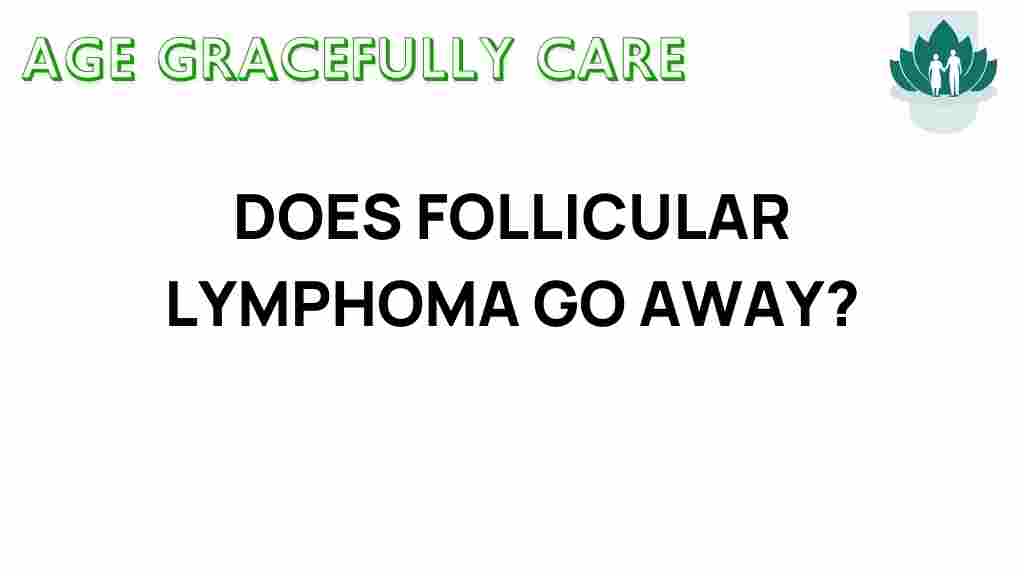Unraveling Follicular Lymphoma: Does It Ever Truly Disappear?
Follicular lymphoma is a type of non-Hodgkin lymphoma that affects the lymphatic system, which plays a crucial role in our immune response. Understanding the dynamics of this cancer, including its treatment options, potential for remission, and overall prognosis, is essential for patients and their families. This article delves into the complexities of follicular lymphoma, exploring whether it can ever truly disappear, the latest research findings, and what patients can expect during their journey.
What is Follicular Lymphoma?
Follicular lymphoma is a slow-growing (indolent) form of cancer that arises from B lymphocytes, a type of white blood cell. It is characterized by the formation of lymph node tumors and can also spread to other organs. While it is generally considered less aggressive than other forms of lymphoma, follicular lymphoma can still pose significant health challenges.
Symptoms of Follicular Lymphoma
Symptoms may vary among individuals, but common signs include:
- Painless swelling of lymph nodes in the neck, armpits, or groin
- Fatigue
- Unexplained weight loss
- Fever and night sweats
- Itching
Diagnosis of Follicular Lymphoma
Diagnosis typically involves a combination of physical exams, imaging tests, and biopsies. Patients may undergo:
- Physical examination: A doctor checks for swollen lymph nodes.
- Blood tests: These can indicate the presence of abnormal lymphocytes.
- Imaging tests: CT scans or PET scans to visualize lymph nodes.
- Biopsy: A tissue sample from a lymph node is examined under a microscope.
Treatment Options for Follicular Lymphoma
Treatment for follicular lymphoma can vary widely based on the stage of the disease, the patient’s health, and preferences. The main treatment options include:
1. Watchful Waiting
In some cases, especially when the lymphoma is asymptomatic, doctors may recommend a “watch and wait” approach. This involves regular monitoring without immediate treatment.
2. Chemotherapy
Chemotherapy is often the first line of treatment for symptomatic follicular lymphoma. Common regimens include:
- R-CHOP (Rituximab, Cyclophosphamide, Doxorubicin, Vincristine, Prednisone)
- R-FL (Rituximab with Fludarabine)
3. Targeted Therapy
Targeted therapies, such as ibrutinib and idelalisib, focus on specific pathways involved in the growth of cancer cells and have shown promise in treating follicular lymphoma.
4. Radiation Therapy
Radiation therapy can be effective for localized disease and may be used in combination with other treatments.
5. Stem Cell Transplant
For patients with relapsed or refractory follicular lymphoma, autologous stem cell transplantation may be considered, especially for younger patients with good overall health.
6. Immunotherapy
Recent advancements in immunotherapy, including CAR T-cell therapy, are showing potential for treating follicular lymphoma. This approach modifies a patient’s own T-cells to target and destroy cancer cells.
Understanding Remission and Survival
Achieving remission is a primary goal in the treatment of follicular lymphoma. Remission means that the signs and symptoms of cancer are reduced or undetectable.
What Does Remission Mean?
There are different types of remission:
- Complete remission: No evidence of disease can be found.
- Partial remission: A significant reduction in the size of the tumors but some signs of cancer remain.
Prognosis and Survival Rates
The prognosis for follicular lymphoma varies significantly among patients. Factors influencing prognosis include:
- Age at diagnosis
- Overall health and comorbidities
- Stage of the disease
- Response to initial treatment
According to the American Cancer Society, the 5-year survival rate for follicular lymphoma is approximately 85%, but this can vary widely based on individual circumstances. Regular follow-ups and monitoring are essential for improving long-term outcomes.
Research and Future Directions
Ongoing research into follicular lymphoma is crucial for developing new treatment strategies and improving patient care. Some key areas of focus include:
Advancements in Targeted Therapies
Research is ongoing to identify new targets for therapy and to enhance the efficacy of existing treatments. This includes exploring combinations of immunotherapies and targeted agents to achieve better outcomes.
Biomarkers in Follicular Lymphoma
Identifying biomarkers can help predict which patients are more likely to respond to specific treatments, allowing for personalized medicine approaches.
Long-term Effects and Survivorship
As survival rates improve, researchers are also examining the long-term effects of treatment and the quality of life for survivors of follicular lymphoma.
Patient Care and Support
Living with follicular lymphoma can be challenging, and comprehensive patient care is essential. Here are some tips for managing health during and after treatment:
1. Regular Follow-ups
Patients should maintain regular appointments with their healthcare team to monitor their condition and manage any side effects from treatment.
2. Nutrition and Exercise
A balanced diet and regular physical activity can help improve overall health and well-being. Consult a healthcare provider for personalized advice.
3. Emotional Support
Psychological support is vital. Patients may benefit from counseling, support groups, or talking to friends and family about their experiences.
4. Stay Informed
Staying educated about follicular lymphoma can empower patients to engage actively in their treatment decisions. Reliable resources include:
Troubleshooting Common Concerns
Patients often have concerns about treatment side effects or disease progression. Here are some common issues and how to address them:
- Fatigue: Rest and prioritize sleep, and discuss fatigue management strategies with your healthcare provider.
- Emotional distress: Reach out for mental health support and consider joining support groups.
- Side effects from treatments: Report any side effects to your doctor, who may adjust your treatment plan accordingly.
Conclusion
Follicular lymphoma is a complex and nuanced disease, and while it may not always disappear completely, many patients can achieve significant periods of remission. Ongoing research and advancements in treatment are continually improving the outlook for those affected by this type of cancer. With effective patient care, emotional support, and a proactive approach to health, individuals diagnosed with follicular lymphoma can navigate their journey with resilience and hope.
This article is in the category Health and created by AgeGracefullyCare Team
